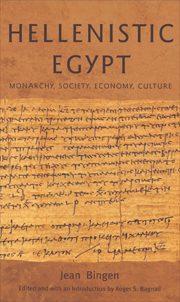Book contents
- Frontmatter
- Contents
- Original Sources of Chapters
- List of illustrations
- Glossary
- Maps
- Foreword
- Introduction: Jean Bingen and the currents of Ptolemaic history
- Part I The Monarchy
- 1 Ptolemy I and the quest for legitimacy
- 2 Ptolemy III and Philae: snapshot of a reign, a temple, and a cult
- 3 Cleopatra, the diadem and the image
- 4 Cleopatra VII Philopatris
- 5 The dynastic politics of Cleopatra VII
- Part II The Greeks
- Part III The Royal Economy
- Part IV Greeks and Egyptians
- Conclusion
- Bibliography
- General index
- Index of passages discussed
- HELLENISTIC CULTURE AND SOCIETY
5 - The dynastic politics of Cleopatra VII
from Part I - The Monarchy
- Frontmatter
- Contents
- Original Sources of Chapters
- List of illustrations
- Glossary
- Maps
- Foreword
- Introduction: Jean Bingen and the currents of Ptolemaic history
- Part I The Monarchy
- 1 Ptolemy I and the quest for legitimacy
- 2 Ptolemy III and Philae: snapshot of a reign, a temple, and a cult
- 3 Cleopatra, the diadem and the image
- 4 Cleopatra VII Philopatris
- 5 The dynastic politics of Cleopatra VII
- Part II The Greeks
- Part III The Royal Economy
- Part IV Greeks and Egyptians
- Conclusion
- Bibliography
- General index
- Index of passages discussed
- HELLENISTIC CULTURE AND SOCIETY
Summary
For nearly half a century, the confrontation between literary testimonies and new documentary evidence about the end of the kingdom of the Ptolemies has continually revised the history of Queen Cleopatra VII. Its perspective is now more appropriate to her actual destiny as a queen, and in this way, on the dynastic level, it has come to be treated less as an aspect of the heavy-handed interventions of Rome in the fate of Alexandria and Egypt. I think, for instance, of Heinz Heinen's work or more recently Thomas Schrapel's or Linda Ricketts's contributions. Lucia Criscuolo (1989) shows that historians have wrongly imagined marriages by extrapolation between Cleopatra and her two young brothers, who were momentarily associated with her as basileis. Michel Chauveau established the political meaning of the royal dates which show a double numbering of the year. Every day, we find – to take inspiration from a recent title – Cleopatra further upstream from her myth.
Let us put aside, hard as it is, the uncountable Cleopatras generated either from the hostile propaganda of Octavian or, since the Renaissance in the Western world, from theatre, painting, novel, film or comics, along with the recent no less imaginary Cleopatras, the militant of women's liberation or the black princess reigning in Alexandria. But the historian should never forget how much his own unconscious is marked by the weight of this luxuriant bimillenary tradition, which has seen the continuous production of contradictory value-judgements even among scholars.
- Type
- Chapter
- Information
- Hellenistic EgyptMonarchy, Society, Economy, Culture, pp. 63 - 80Publisher: Edinburgh University PressPrint publication year: 2007



